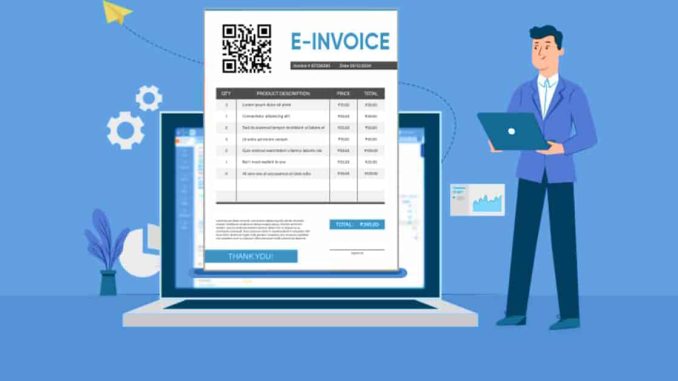
The idea behind the introduction of e-Invoicing is to optimise business processes and reduce operating costs. It replaces the paper-based documentation and automates business processes.
With its numerous advantages, e Invoicing has become a preferred method for businesses to streamline their invoicing processes. However, being aware of the potential consequences of non-compliance with e-Invoicing regulations is crucial.
In this blog, we will learn about e-Invoice compliance. And also understand the legal and regulatory requirements.
e-Invoicing
Before knowing e-Invoice compliance, we need to understand the basics of e-Invoice.
e-Invoicing, or electronic invoicing, involves electronically delivering invoices between suppliers and buyers in a standardised format recognised by government tax portals. This system ensures that all businesses adhere to a common format when reporting invoices on the GST portal, eliminating manual invoice handling and bringing accuracy and efficiency to the invoicing process.
What does compliance mean for electronic invoicing?
Compliance in e-Invoicing entails adhering to the legal and regulatory requirements governing the use of electronic invoicing. To ensure compliance with the e-Invoicing process:
- Follow specific rules set by governments and tax authorities.
- Maintain proper formatting, data accuracy, digital signatures, and timely submission.
- Non-compliance can result in fines and legal repercussions.
- Ensure that electronic invoices meet all criteria mandated by the authorities.
Importance of e-Invoicing Compliance
e-Invoicing compliance refers to adhering to the legal and regulatory requirements governing electronic invoicing. It is important to do the following:
To discharge legal responsibilities
Businesses in India need to adopt electronic invoicing practices. Failure to comply with these mandates, not filling in correct data, missing deadlines, inadequate record-keeping, etc., can lead to penalties and legal consequences.
Protect data
e-Invoicing involves the exchange of sensitive financial information. Compliance measures ensure the security and integrity of this data. Thus, you can avoid unauthorised access and fraud by using Compliant.
Efficiency in tax filing
Compliant e-Invoices are essential for accurate tax reporting and compliance. Properly structured e-Invoices facilitate tax calculation and reporting. This reduces the risk of errors and audits.
To enhance the reputation of the business
Compliance with e-Invoicing rules enhances the reputation of the business. It reflects a commitment to ethical practices and responsible financial management.
e-Invoicing Compliance: Know its Best Practices
To navigate the complexities of e-Invoicing compliance successfully, businesses can get help from the following best practices:
Need to conduct regulatory research.
It would be best if you always stay informed about the e-Invoicing rules as per your business. To integrate this into your business, it is extremely important to ensure its continuous compliance.
Need to invest in e-Invoicing Software.
Linking your business to a reputable e-Invoicing software provider helps you with e-Invoicing compliance. It provides you with features tailored to meet specific regulatory requirements.
Need to implement training and education.
To get e-Invoice compliance, you need to train your finance and accounting teams with best practices. This ensures that your staff understands the legal and regulatory landscape is crucial.
Need regular Auditing and Monitoring.
Establishing a system for regular auditing and monitoring of e-Invoicing processes is the best e-Invoicing practice. It helps to identify and rectify compliance issues promptly.
Role of e-Invoicing Software in Compliance
e-Invoicing software plays a key role in ensuring compliance with legal and regulatory requirements. Here’s how:
It offers automated compliance checks.
Modern e-Invoicing software often includes features for automated compliance checks. These checks help validate e-Invoices against relevant regulations before submission.
It proffers data encryption.
e-Invoicing software typically employs robust encryption protocols. This way, businesses are able to safeguard invoice data from unauthorized access.
It gives accurate tax calculation and reporting.
e-Invoicing solutions can calculate taxes accurately based on the information provided in the e-Invoice. This feature streamlines tax reporting and reduces the risk of errors.
You can get quick and easy invoice retrieval.
e-Invoicing software offers features for secure and easy retrieval of e-Invoices. It ensures businesses can meet retention requirements.
You can manage integration with regulatory updates.
e-Invoicing software providers regularly update with changing regulations. This ensures that businesses using the software remain compliant even as requirements evolve.
Frequently Asked Questions
Why is e-Invoicing compliance important?
e-Invoicing compliance ensures that businesses follow the law and reduce the risk of penalties. It also promotes transparency and efficiency in financial transactions.
What are the key components of e-Invoicing compliance?
Key components include data accuracy, digital signatures, secure storage, audit trails, and compliance with local invoicing standards.
What are the penalties for non-compliance?
Penalties for non-compliance can include fines, legal actions, or suspension of business operations.
Conclusion
e-Invoicing provides significant benefits to businesses. So, businesses need to be aware of their compliance with relevant regulations. Doing so can help you understand the implications of e-Invoicing penalties and help businesses avoid financial losses, legal hassles and reputational damage.

Leave a Reply